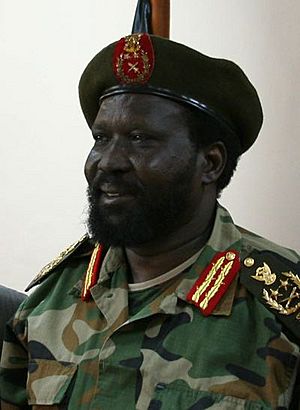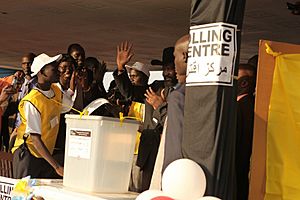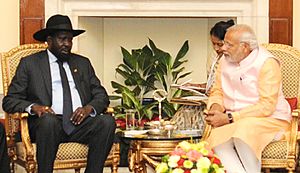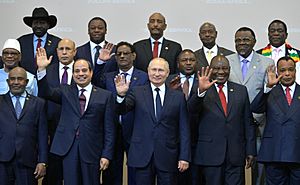Salva Kiir Mayardit facts for kids
Quick facts for kids
Salva Kiir Mayardit
|
|
|---|---|
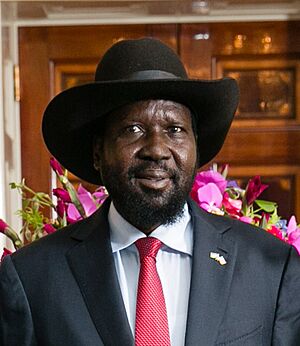
Kiir in 2014
|
|
| 1st President of South Sudan | |
| Assumed office 9 July 2011 |
|
| Vice President | Riek Machar Benjamin Bol Mel Taban Deng Gai Rebecca Nyandeng De Mabior Josephine Lagu |
| Preceded by | Position established |
| 2nd President of Southern Sudan | |
| In office 11 August 2005 – 9 July 2011 Acting: 30 July – 11 August 2005 |
|
| President of Southern Sudan|Vice President | Riek Macharudan |
| Preceded by | John Garang |
| Succeeded by | Position abolished |
| First Vice President of Sudan | |
| In office 11 August 2005 – 9 July 2011 |
|
| President | Omar al-Bashir |
| Preceded by | John Garang |
| Succeeded by | Ali Osman Taha |
| 3rd Vice President of Southern Sudan | |
| In office 9 July 2005 – 11 August 2005 |
|
| President | John Garang Himself (acting) |
| Preceded by | Position established |
| Succeeded by | Riek Machar |
| Personal details | |
| Born | 13 September 1951 Akon, Anglo-Egyptian Sudan |
| Political party | Sudan People's Liberation Movement |
| Spouses | Mary Ayen Mayardit Aluel William Nyuon Bany |
| Children | 2 |
| Military service | |
| Allegiance | (1967–1972) (1972–1983) (1983–2011) (since 2011) |
| Years of service | 1967–2011 |
| Commands | Commander-in-Chief of the South Sudan People's Defence Forces Sudan People's Liberation Army Anyanya Battalion |
| Battles/wars |
|
Salva Kiir Mayardit (born 13 September 1951), often called Salva Kiir, is a politician from South Sudan. He has been the President of South Sudan since the country became independent on 9 July 2011. Before South Sudan became its own country, he was the President of the Government of Southern Sudan. He also served as the First Vice President of Sudan from 2005 to 2011. In 2005, he became the Commander-in-Chief of the Sudan People's Liberation Army (SPLA) after John Garang passed away.
Kiir was born into the Dinka ethnic group. He joined the Anyanya rebels in 1967, fighting for Southern independence during the First Sudanese Civil War. When the Second Sudanese Civil War began in 1983, Kiir joined a new rebel group called the Sudan People's Liberation Movement (SPLM). He was part of its armed group, the Sudanese People's Liberation Army (SPLA), and later became its leader. After a peace agreement in 2005, Southern Sudan gained some self-rule. When John Garang died that same year, Kiir became the new President of the Southern Autonomous region and also the First Vice President of Sudan's central government. Kiir was re-elected as President in 2010. The next year, South Sudan became an independent country after a vote, and Kiir became its first President.
Contents
Early Life
Kiir was born in 1951 in a village called Akon in Gogrial County, South Sudan. His family were cattle herders from the Dinka people. He was the eighth of nine children. His father, Kuethpiny Thiik Atem, had three wives and 16 children. Kiir's mother, Awiei Rou Wol Tong, was a farmer.
Military Career and Civil Wars
In 1967, Kiir joined the Anyanya rebel group during the First Sudanese Civil War. By 1972, when a peace agreement was signed, he was a low-ranking officer. He then joined the Sudanese Armed Forces. In 1983, when the Second Sudanese Civil War started, Kiir and other Southern leaders joined the new Sudan People's Liberation Army/Movement (SPLA/M). John Garang, who had a lot of military experience, led the group, and Kiir served as his deputy.
Kiir became the head of the SPLA, which was the SPLM's military part, after Dr. John Garang died in a helicopter crash. There were some disagreements about his role as SPLA Chief of Staff in 2004, but the group stayed together.
South Sudanese Politics
After the Comprehensive Peace Agreement ended the war in January 2005, Garang became the Vice President of Sudan. When John Garang died on 30 July 2005, Kiir was chosen to take his place as the First Vice President of Sudan and President of Southern Sudan. Before independence, many in the SPLA/M military wing liked Kiir because he stayed loyal to their goals.
In October 2009, Kiir spoke about the upcoming vote for independence. He said it was a choice between being "a second class" in their own country or "a free person in your independent state." This showed how important independence was to him. In 2010, Kiir decided to focus on being re-elected as president of Southern Sudan instead of running for Sudanese president. This showed that the SPLM's main goal was independence.
Kiir won re-election with 93% of the votes in the 2010 South Sudanese election. This big win was seen as a key step towards South Sudan becoming independent. After his re-election, Omar al-Bashir reappointed Kiir as the First Vice President of Sudan.
Presidency
In January 2011, people in South Sudan voted to become independent from Sudan. A huge 98.83% of voters chose to separate. On 9 July 2011, South Sudan became an independent country, and Kiir became its first president.
As president, Kiir wanted to bring about positive changes. In his first speech, he asked the people of South Sudan "to forgive" past unfairness from northern Sudan. He also offered a general pardon to groups that had fought against the SPLM. A few weeks later, he told military and police members that bad actions like violence against people would be treated as crimes and investigated. His time as president has been about rebuilding the country, even with some challenges both inside and with other countries. These challenges included a border conflict with Sudan and political issues within South Sudan.
Domestic Policy
In June 2013, Kiir ordered investigations into a corruption case involving two government ministers. He also suspended them from their duties during the investigation. In July 2013, Kiir removed his entire cabinet, including his vice president, Riek Machar. This was done to make the government smaller. However, Machar said this was a step towards a one-person rule and that he would challenge Kiir for the presidency.
In December 2011, there were conflicts between the Lou Nuer and Murle communities. Investigations showed that many people from both groups were killed, and some women and children were taken. Kiir set up a committee to investigate these events, but it faced challenges in getting started.
During a disarmament effort in Jonglei in 2012, soldiers were accused of using harsh methods to find weapons.
Changes in Government
After some rumors in late 2012, Kiir started making big changes to the leaders in his government, party, and military. In January 2013, he changed the head of the national police and removed many high-ranking army officers. In February 2013, Kiir retired more army generals. He also suggested that some rivals were trying to cause problems like those seen in the 1990s.
In May 2013, Kiir removed a legal advisor and a deputy foreign minister. He stated that he would not accept criticism from his cabinet members. In July, he removed his entire cabinet. In December 2013, Kiir accused his vice president and other party members of planning to take over the government. These events led to the start of the South Sudanese Civil War.
Safety of Journalists
Moi Peter Julius, a reporter for a South Sudanese newspaper, was found murdered in August 2015. This happened three days after Kiir publicly warned journalists that working against the country could have serious consequences. Earlier in 2015, five other journalists were killed while traveling in a convoy. Groups that protect journalists have asked for those responsible for these deaths to be found and brought to justice.
In December 2022, a video of Kiir at a public event was widely shared online. Six staff members of the South Sudan Broadcasting Corporation were later arrested in January 2023 in connection with this video. They were eventually released without charges.
Foreign Policy

In October 2011, Kiir announced that South Sudan wanted to join the East African Community. He said this group was very important to South Sudan because its members had supported them during the civil wars.
In December 2011, Kiir visited Israel to thank them for their help during the First Sudanese Civil War. He met with Israeli president Shimon Peres to talk about opening an embassy in Jerusalem.
After the South Sudanese civil war began, Salva Kiir criticized the United Nations and some aid organizations in January 2014. He accused them of helping his opponents.
Heglig Crisis and Border Issues
On 26 March 2012, the South Sudanese army attacked an oilfield in Heglig, a town near the border with Sudan. This led to the Heglig Crisis. On 27 September, Kiir met with Sudanese President Omar al-Bashir. They signed eight agreements to restart important oil exports and create a 6-mile (10 km) demilitarized zone along their border. These agreements also included plans for marking their border and protecting each other's citizens.
In November 2012, South Sudan officially complained to the United Nations Security Council (UNSC) about bombings by the Sudan Armed Forces (SAF) in northern South Sudan. These attacks killed and injured several people. South Sudan saw this as a serious violation of the cooperation agreement they had signed.
Political Challenges
In September 2013, an article by an analyst named Duop Chak Wuol appeared online. He warned about problems if the ruling SPLM party did not change its policies. Tensions grew between Kiir and his former vice president Riek Machar in December 2013. On the night of 15 December 2013, shooting broke out among Salva Kiir's Presidential Guards. The next day, Kiir accused Machar and other SPLM officials of trying to overthrow his government. Machar and others denied this. These events marked the beginning of the South Sudanese Civil War. By April 2018, it was estimated that about 400,000 people had died in the war.
South Sudan Famine
In early 2017, parts of South Sudan faced a severe famine. This was caused by several years of instability in the country's food supply, due to civil war and drought. Aid groups said the famine was made worse by the ongoing conflict. More than 3 million people had to leave their homes because of the violence. This forced families to abandon their farms and livestock, leaving them with very little food. The worst fighting was in Unity State.
Days after the famine was declared, the government increased the price of a business visa, especially for aid workers. UN officials also stated that Kiir's government was blocking food deliveries to some areas.
Personal Life
His Stetson Hat

In 2006, when Kiir visited the White House, he received a black stetson hat as a gift from U.S. President George W. Bush. He reportedly liked it so much that he bought several more. Now, he is often seen wearing one in public.
Religion
Kiir is Catholic.
Images for kids
See also
 In Spanish: Salva Kiir Mayardit para niños
In Spanish: Salva Kiir Mayardit para niños
 | George Robert Carruthers |
 | Patricia Bath |
 | Jan Ernst Matzeliger |
 | Alexander Miles |


